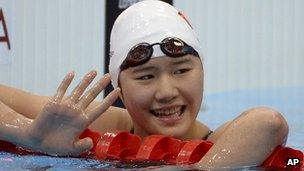Chinese Olympic swimmer Ye Shiwen denies doping
- Published

Ye Shiwen said her success was a result of hard work and training
China's 16-year-old swimming prodigy Ye Shiwen has denied taking performance-enhancing drugs, after smashing a world record at the London Olympics.
Ye won gold in the 400m individual medley after breaking her personal best by at least five seconds.
She swam the last 50m quicker than the men's champion, prompting leading US coach John Leonard to describe her performance as "disturbing".
There is no evidence against her and all medal winners are drug-tested.
She is due to race in the final of the 200m individual medley later on Tuesday.
Commentators were stunned at her performance in the 400m on Saturday, and the BBC's Clare Balding said after the race that questions would be asked about how she achieved the world-record time.
The BBC's Martin Patience in Beijing says the accusations against Ye have sparked an angry reaction from Chinese internet users, who have accused other nations of jealousy.
'Clean hands'
Mr Leonard, executive director of the World Swimming Coaches Association, said her performance reminded him of the East German women swimmers in the 1980s who were doping on a systematic basis.
"History in our sport will tell you that every time we see something, and I will put quotation marks around this, unbelievable, history shows us that it turns out later on there was doping involved," he told the UK's Guardian newspaper.
Ye denied the allegations against her, telling reporters: "My results come from hard work and training and I would never use any banned drugs. The Chinese people have clean hands."
And Chinese swimming team leader Xu Qi told China's state-run Xinhua news agency that comparisons between Ye and Lochte were meaningless.
"Ye was behind after 300m and she needed to try her best to win the race, but Lochte had already established the lead before the freestyle and didn't need to do his upmost," he said.
China's swimming team was repeatedly hit by doping scandals in the 1990s.
Seven swimmers tested positive for drugs in the 1994 Asian Games, and four years later four Chinese swimmers failed pre-tournament drug tests before swimming world championships in Australia.
Chinese officials insist they have cleaned up the sport, but earlier this year another 16-year-old swimming prodigy, Li Zhesi, failed a drug test.
'Right combinations'
Experts and former swimmers have said Ye's rapidly improved performance was not unprecedented.
Former Olympic champion Ian Thorpe told the BBC he had also improved his personal-best time by five seconds in a year during the early part of his career.
"We have to remember that young swimmers can take chunks of time off that other people can't," Thorpe said.
Biomechanics expert Andrew Cresswell said swimmers could achieve dramatic improvements by working on their strength and technique.
"Those two factors combined can lead to large increases. [Ye's performance] certainly is possible if those right combinations were improved," he told the BBC.
Arne Ljungqvist, medical commission chairman for the International Olympic Committee, called the speculation sad.
"To raise suspicion immediately when you see an extraordinary performance - to me it is against the fascination of sport," he said.
All medal winners at the Olympics are drug tested. In addition, any athlete whose performance is far better than anything they have achieved before can be targeted for extra tests.
China's anti-doping chief has said that Chinese athletes have undergone nearly 100 drugs tests since arriving in London, and that not a single Chinese athlete had tested positive.
- Published31 July 2012
- Published31 July 2012
- Published27 July 2012
- Published31 July 2012